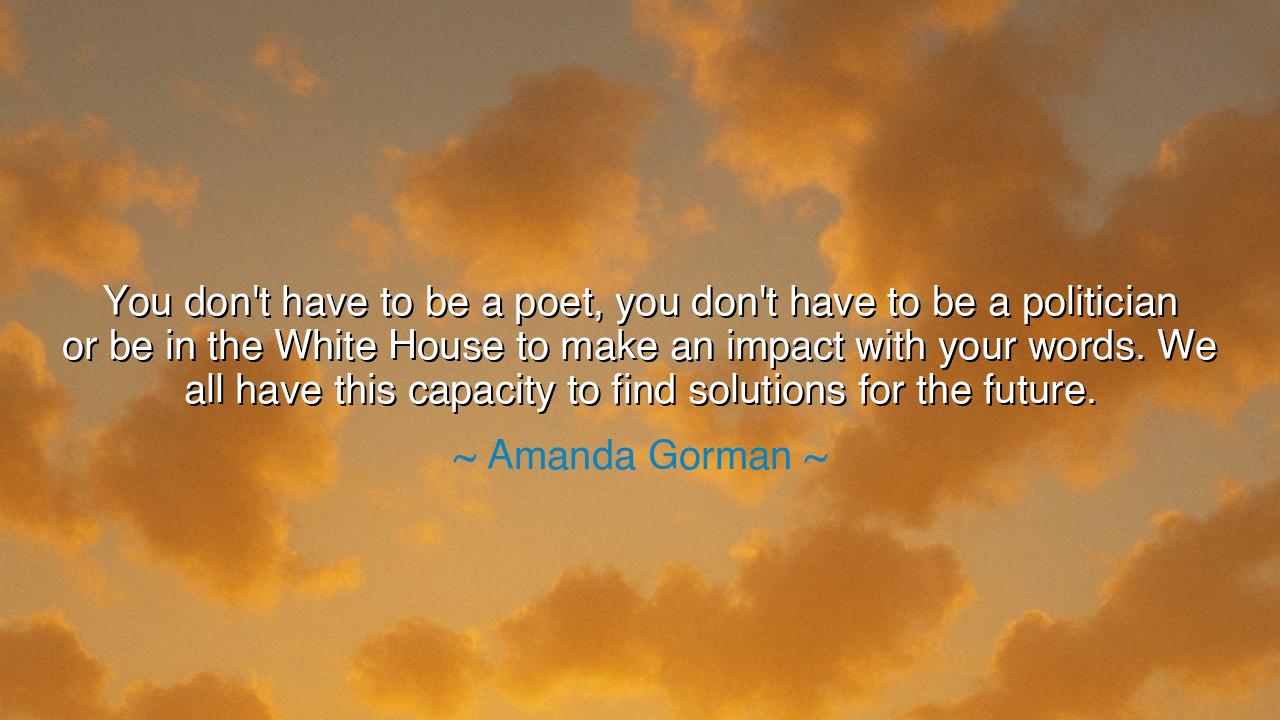
You don't have to be a poet, you don't have to be a politician or
You don't have to be a poet, you don't have to be a politician or be in the White House to make an impact with your words. We all have this capacity to find solutions for the future.






In the timeless tapestry of human history, one thread runs through all great deeds: the power of words. Amanda Gorman’s words, “You don't have to be a poet, you don't have to be a politician or be in the White House to make an impact with your words. We all have this capacity to find solutions for the future,” echo the ancient understanding that language is one of the most powerful tools we possess. It is not only in the grand speeches of statesmen or the works of great poets that we find the ability to shape the world, but in the words of every individual, spoken or written, that can plant seeds for change and progress. Gorman’s message is that each voice—whether heard by a few or by many—has the power to influence and inspire.
In the age of the ancient Greeks, orators like Pericles were known for their powerful speeches that stirred the hearts of the people and shaped the direction of Athenian democracy. But Plato, the philosopher, was just as clear that wisdom and the ability to make an impact with words were not reserved for the few. In The Republic, he argued that it is through the careful art of discourse that societies shape the virtue and moral compass of their citizens. Gorman’s sentiment mirrors this ancient wisdom: it is not just those who hold great titles or offices who have the capacity to influence, but every voice that speaks with intention and purpose.
Consider the story of Socrates, whose teachings, though not written down in his lifetime, were passed on through the words of his students. Socrates did not seek power or fame. He did not occupy a throne, nor was he a poet celebrated in the courts. Yet his dialogues have had a lasting impact on Western thought, and his method of questioning, now known as the Socratic Method, has shaped how we engage with ideas and truths to this day. Socrates demonstrates that even the simplest words can change the course of history when they are rooted in the pursuit of truth and understanding.
In the modern world, we see Gorman’s truth reflected in the impact of individuals whose words—though not always in the halls of power—have created monumental change. Mahatma Gandhi, for example, did not wield power through weapons, nor did he seek office; instead, his words of non-violence, unity, and justice have inspired millions. His famous Salt March was not a military conquest but an act of resistance and empowerment, fueled by his belief in the power of words to unite and awaken a nation. Gandhi’s words, like Gorman’s, show that the impact of language extends far beyond positions of authority; it lies in the clarity of purpose and the depth of conviction with which they are spoken.
Gorman’s quote also speaks to the universal potential for creativity and problem-solving that resides in every individual. Whether one is a poet, a teacher, a parent, or an activist, the ability to articulate ideas and create solutions is a gift that we all hold. Just as the ancient storytellers passed down wisdom, solutions, and morals through their words, so too can we, in our own ways, contribute to the world’s progress. The story of Archimedes, for example, is not only that of a brilliant mathematician but of a man whose insightful words on physics and geometry revolutionized science. Archimedes' discovery of the principle of buoyancy, shouted out in joy as “Eureka!” in his bath, changed the course of scientific understanding. Words, whether spoken in excitement or written in quiet reflection, can lead to the discoveries and solutions we need to confront the challenges of the future.
The lesson we learn from Gorman’s reflection is clear: each of us possesses the power to shape the world through our words. Language, as the ancients knew and Gorman reminds us, is a tool of change, one that transcends titles or positions. Whether in our families, our communities, or in the larger world, the words we speak have the potential to inspire, educate, and transform. As rhetoricians of old shaped the fates of empires, so too can we, in our own way, influence the future.
As we navigate the complexities of the world today, we must take to heart the responsibility of our words. Let us speak not just for the sake of speaking, but with purpose and intent, knowing that in every conversation, every written word, and every idea shared, we carry the potential to create a more just, compassionate, and thoughtful world. Each word we utter is a seed for the future, and it is up to us to plant them wisely, nurturing them into solutions that will grow and flourish for generations to come. Like the ancient philosophers, like Gandhi, and like Gorman herself, let us wield the power of language for good, knowing that it is in our words that we can create the change we wish to see.






AAdministratorAdministrator
Welcome, honored guests. Please leave a comment, we will respond soon